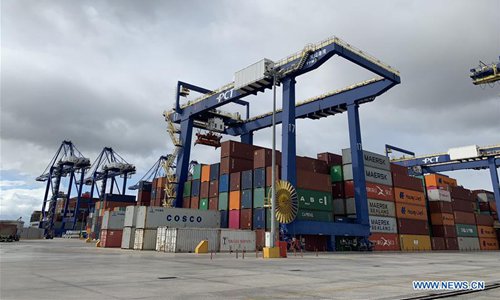China-Europe sea-land express transport takes shape
By Li Xuanmin Source:Global Times Published: 2020/5/21 18:38:40

The photo taken on Feb. 15, 2019 shows the Piraeus Container Terminal in Piraeus, Greece. (Xinhua/Yu Shuaishuai)
The parliament of Hungary approved the upgrade of a rail link between Budapest and Belgrade, Serbia, after Hungary secured loans from a Chinese policy bank, a move that industry insiders could pave the way for a new, more cost-effective sea-land transport route under the Belt and Road Initiative (BRI) which will assist China to ship goods to Europe from Piraeus, Greece.
The cooperation also sheds light on how Europe maintains diplomatic independence from the US and builds closer economic ties with China in the post-pandemic period, as investment from the latter - the first in the world to emerge from the shadow of the outbreak - will likely become a key driving force for European economy.
The 350-kilometer Hungary-Serbia railway link, with a maximum designed speed of 200 kilometers an hour, will halve the travel time between the two capitals from eight hours to only four hours, according to a report by China Central Television (CCTV).
The existing line was built in 1882.
In 2014, China, Hungary and Serbia signed a memorandum of understanding on the upgrading project. Construction of the rail lines in Serbia has been carried out steadily while the project in Hungary was postponed due to investigation by the European Commission over doubts about the project's profitability.
"The Hungary-Serbia line, once completed, will be one step closer to China's blueprint to construct a sea-land express transport system that links China with Europe via the Piraeus port in Greece," Cui Hongjian, director of EU studies at the China Institute of International Studies in Beijing, told the Global Times on Thursday.
But he noted that for the express project to take shape, a rail link between Piraeus port and Macedonia will still need to be built.
COSCO, China's largest shipping company by fleet size, acquired a 51-percent stake in Piraeus port in 2016.
Zhao Junjie, a research fellow at the Chinese Academy of Social Sciences' Institute of European Studies, told the Global Times on Thursday that compared with China-Europe freight trains that mostly transferred their cargo via Poland on the way to western Europe, the sea-land link would be cheaper and able to reach more destinations in eastern and central Europe.
"It will make trade between China and Europe more convenient as trade flows will jump after China and the EU sign a bilateral investment treaty (BIT)," Zhao said.
Beijing and Brussels are expected to sign a BIT by the end of this year.
In April, the National Development and Reform Commission, China's economic planner, announced that the Export-Import Bank of China had signed a loan deal for the project with Hungary's Ministry of Finance. The deal signaled that the project would enter the implementation stage.
About 85 percent of the project's financing comes from China, Reuters reported.
"Financing from China plays a pivotal role for the project to press ahead. This offers insights for European countries, most of which have been battered by the coronavirus outbreak and face an uphill battle to prevent economic contraction. A closer economic relationship with China will provide them with a much-needed shot in the arm," Zhao said.